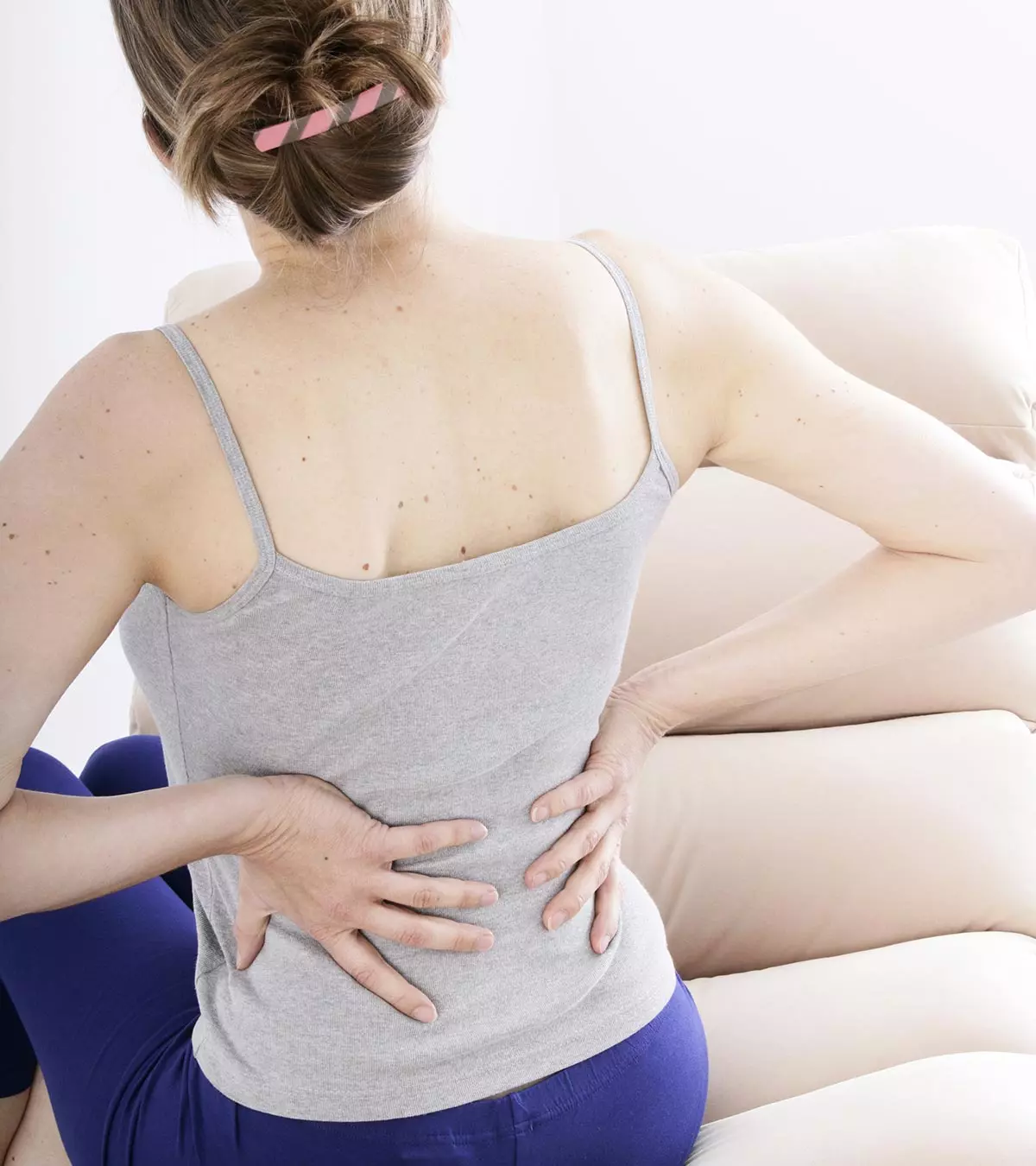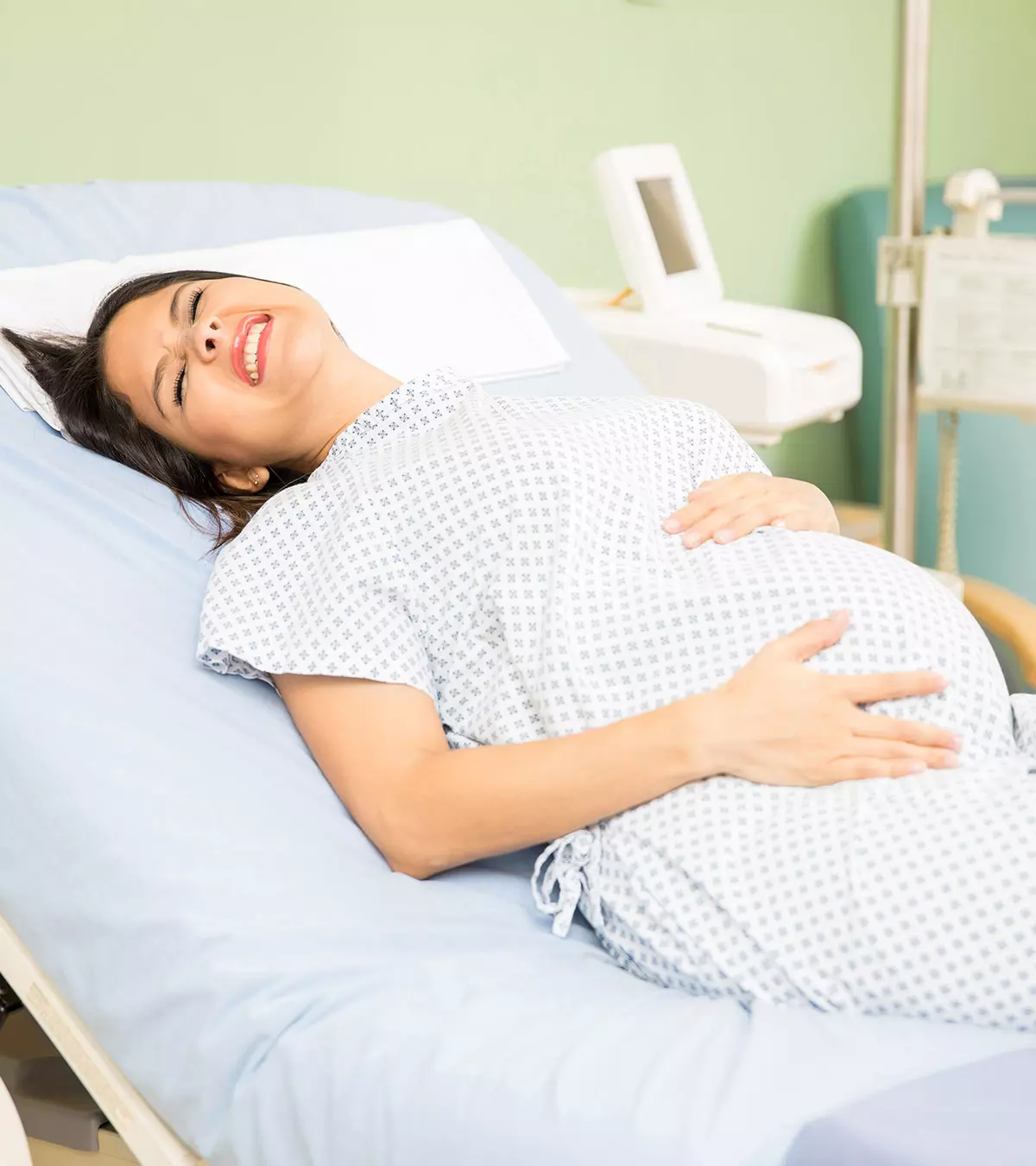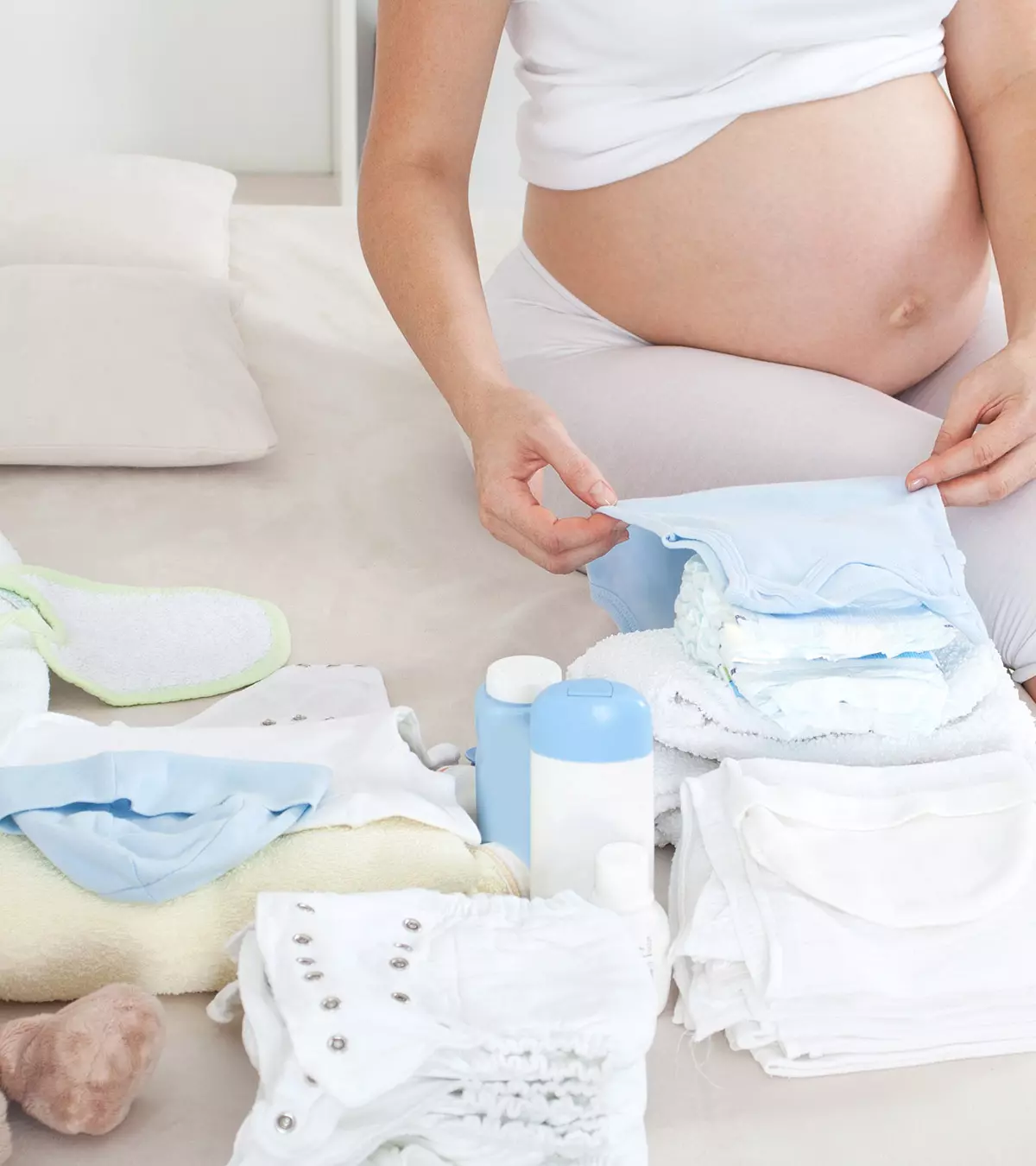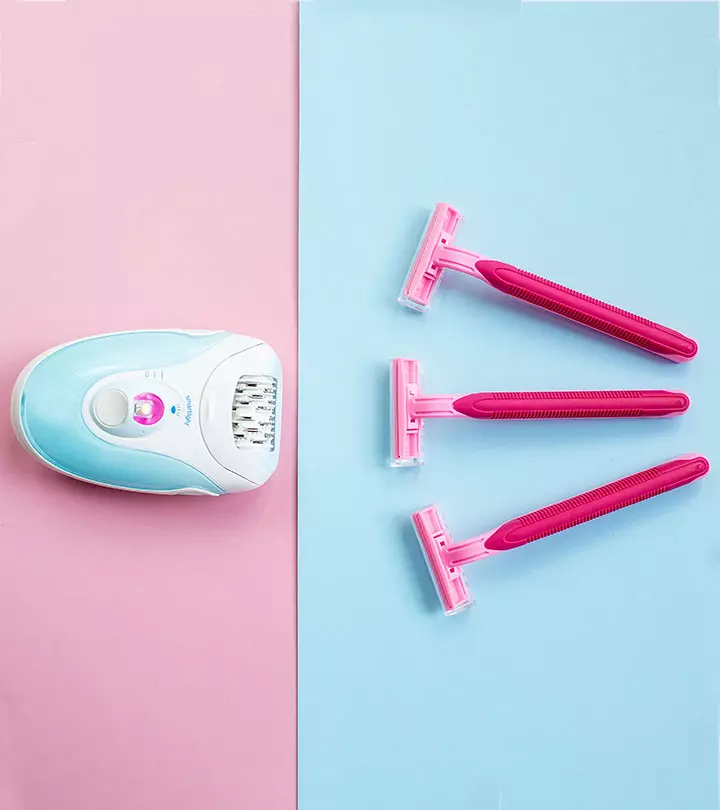
Shutterstock
Most mothers are often confused about whether pubic hair shaving when pregnant or before delivery is necessary

. However, if not done beforehand, you may undergo perineal hair shaving while you are prepped for delivery. This may cause some mothers to feel uncomfortable, more so because of the stress of the delivery.
This article discusses why pubic hair is shaved before delivery, how it should be done, and its benefits and risks.
Key Pointers
- Pubic hair is shaved before delivery to maintain hygiene and for your convenience.
- Shaving pubic hair helps prevent microbe infestation and makes it easy to wash the area.
- To remove pubic hair, you can resort to waxing, hair removal creams, or electric shavers.
Why Is Pubic Hair Shaved Before Delivery?
In many hospitals, it is a practice to get pregnant women shave their pubic hair before delivery. Here are the reasons why it is done (1):
- To make your childbirth hygienic. This is purely for your convenience.
- Helpful in C section deliveries.
Sometimes, the nurse or a helper at the hospital does the job for you but it could be embarrassing to get it done by a stranger
. If you want to be clean-shaven for your labor, then you may want to get it done in advance.
When Should You Shave?

Experts say that you should not shave or wax seven days before your scheduled delivery – be it a normal or Cesarean. This is primarily to avoid infections on the little cuts in your skin, which could attract bacteria (2).
Shaving pubic hair has been a highly debatable topic. While a number of hospitals advice mothers-to-be to shave, researchers are against it. You may make an informed decision after weighing the pros and cons of pubic shaving.
What Are The Benefits And Risks Of Shaving Pubic Hair During Pregnancy?
This information might help you decide whether or not to shave your pubic hair:
Benefits:
- Pubic hair is an ideal place for microbe infestation. This makes it necessary to keep the area clean to keep any infections at bay.
- A clean-shaven pubic area provides a better view to the gynecologist if she wants to make any interventions, such as using forceps, during your vaginal birth.
- Trimming or shaving of the pubic hair reduces sweating and keeps the area clean.
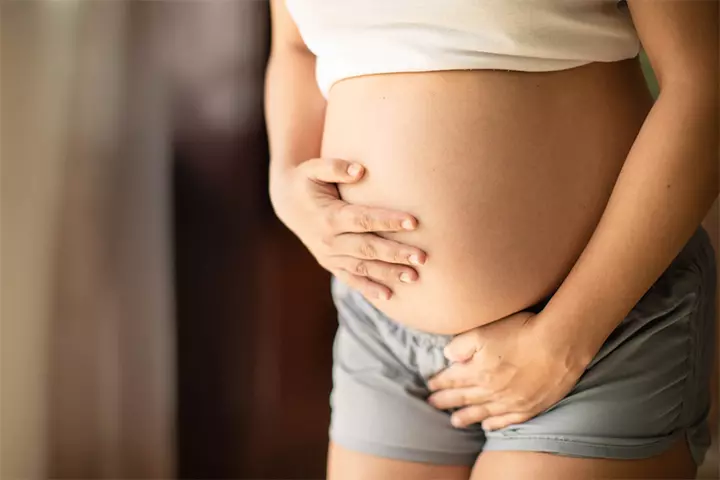
- It is convenient to have a shaved area so that the excessive bleeding post-delivery does not stick to the hair and make it difficult to wash.
Risks:
- If hygiene is not maintained while shaving, it may lead to infections. You must use sterilized or disposable tools for the purpose.
- The regrowth of hair can cause discomfort due to the itching sensation.
- If not shaved properly, it can lead to ingrown hair, wherein the hair starts growing inside the skin causing painful bumps. This also could lead to Bartholin cyst development, which is painful and requires antibiotics.
- The more practical problem with shaving while pregnant is you need to take somebody’s help because your bump blocks your view of the pubic area.
If you are still unable to decide on what to do with your pubic hair, then seek help to clear your concerns.
 Point to consider
Point to considerConcerned About Shaving Pubic Hair Before Delivery?
Do this:
- Consult your doctor and discuss your concerns. Get to know the safety precautions you need to follow.
- Talk with your friends or close family members who have shaved/ not shaved during their labor. This may help change your views about this procedure.

- If you decide to go ahead with shaving, then do not hesitate to take help from your partner.
- But make sure you are opting for a safe method.
How To Remove Pubic Hair During Pregnancy?
Here are various ways you can shave your pubic hair:
- Waxing and sugaring is a method wherein heated syrup is spread over the skin and lifted off to remove the hair. With a growing belly, it becomes difficult for you to bend and do the grooming. Therefore, get it done in a saloon where an expert can safely carry out the procedure for you.
- You may use hair removal creams as long as your skin is not sensitive towards them, and you have used them earlier. Chemical substances in the creams break down the hair follicle cells and dissolve it, facilitating easy removal of hair from the pubic area. Before applying the cream, perform a patch test on a small skin area to check for any allergies.
- You can also use electric shavers for a quick shaving of pubic hair. You may use it throughout your pregnancy. However, ensure to clean and sanitize them before use to prevent infections.

Important Tips To Remember
If you are removing the pubic hair by yourself:
- Use your fingers to feel and locate the area while going down and shave off the hair using a hair removal cream.
- Get into a bathtub and lay on your back. This position could help you see and shave the region.
- Place a fogless mirror on the wall or the floor such that you can see and angle yourself properly. It helps to guide you while grooming.
 Quick tip
Quick tipIf a nurse is shaving your pubic hair just before your delivery, then here is what you can do to avoid any anxiety:
- Do not get embarrassed while your nurse or midwife is carrying out this procedure because it is a standard procedure followed in almost all the hospitals and the midwives are used to it.
- Make sure that the person uses a new razor pack. The packet should be opened in front of you.
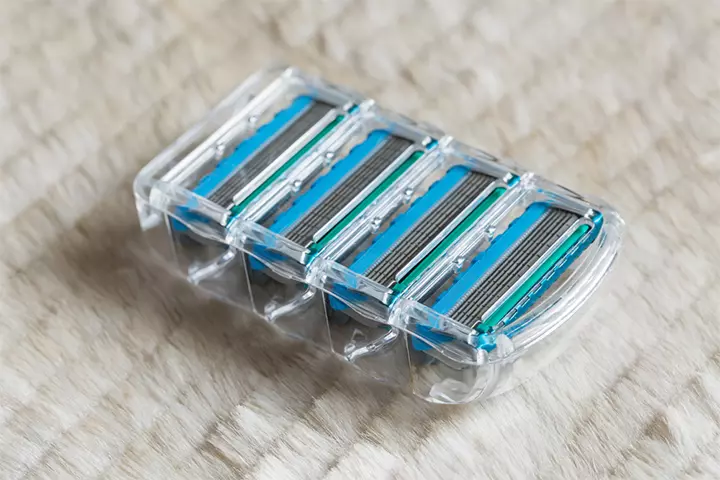
- If it is hurting you, let your midwife know about it. This is important because any cuts or nicks can lead to infection.
- Do not panic as this is a routine carried out both during Cesarean and vaginal birth.
Frequently Asked Questions
1. Does body hair go away after pregnancy?
Due to the increase in estrogen levels during pregnancy, there is an observed increase in the growth and thickness of body hair. But postpartum, these hormone levels return to normal, and so does the hair growth (3).
2. Is it OK to shave before giving birth?
Minimal research highlights the benefits of perineal shaving before giving birth (4). Therefore, it is a personal choice that you need to make, keeping the risks and benefits in mind.
3. Can waxing put me into labor?
No. There is no scientific evidence to conclude that waxing induces labor. The process may feel more painful because of the increased sensitivity, but it is not known to expedite labor in women.
Shaving your pubic hair is a matter of personal preference. Note that there are pros and cons associated with shaving when pregnant. For example, a shaved vagina offers a few benefits to the gynecologist during delivery and reduces the risk of infection. However, a few women might feel uncomfortable seeking others’ help to shave, and there may be an increased risk of cuts. Hence, if you are unsure what to do, discuss your choices with your medical practitioner. Consider both pros and cons and make an informed decision.
Infographic: Shaving Body Hair During Pregnancy: Tips To Do It Safely
Whether it is your baby shower party or a day out with family, you may want to get rid of excess body hair to flaunt your flawless skin. However, there is a possibility that your skin reacts differently to shaving or waxing hair when pregnant. So, consider the tips in this infographic on shaving when pregnant to safely carry out the process.
Some thing wrong with infographic shortcode. please verify shortcode syntax
Why is it important to share during pregnancy and before delivery? Get the answers to these questions and learn the best methods to do this with the following video.
References
- Natalie Jolly; (2017); Birth and the Bush: Untangling the Debate Around Women’s Pubic Hair.
https://onlinelibrary.wiley.com/doi/full/10.1111/birt.12269 - Having a C-section? What pregnant women should know.
https://utswmed.org/medblog/c-section-what-to-know/ - 6 ways your body can change after childbirth.
https://www.hopkinsmedicine.org/health/conditions-and-diseases/staying-healthy-during-pregnancy/pregnancy-and-skin-changes - Routine perineal shaving on admission in labour; Cochrane Database Syst Rev. 2014; NCBI.
https://www.ncbi.nlm.nih.gov/pmc/articles/PMC7076285/ - Cesarean section.
https://www.ncbi.nlm.nih.gov/books/NBK546707/
Community Experiences
Join the conversation and become a part of our nurturing community! Share your stories, experiences, and insights to connect with fellow parents.
Read full bio of Cheryl Rowe
Read full bio of shreeja pillai
Read full bio of Rebecca Malachi
Read full bio of Reshmi Das





